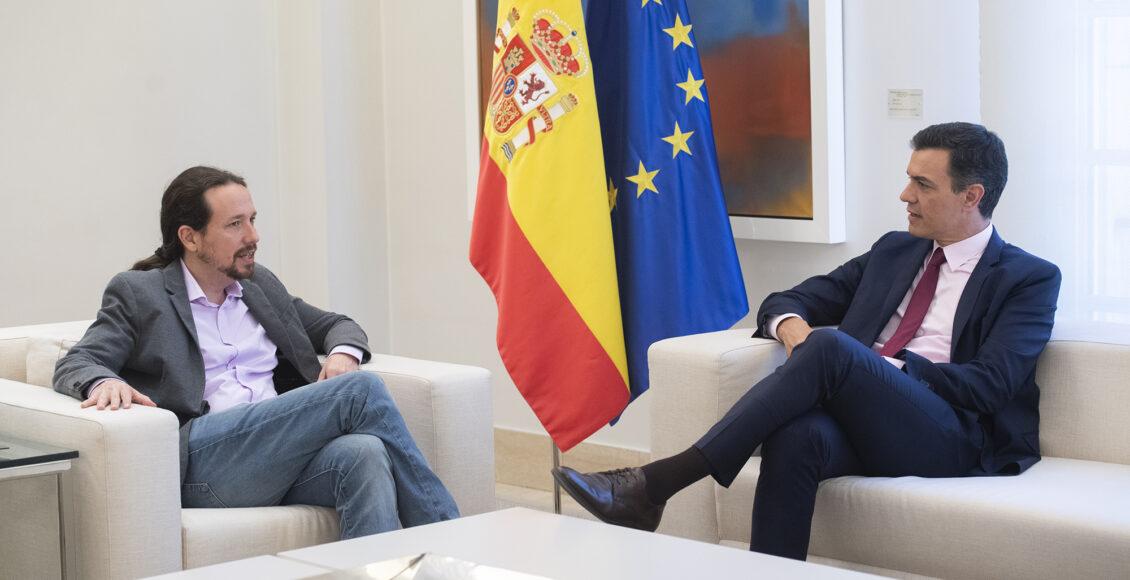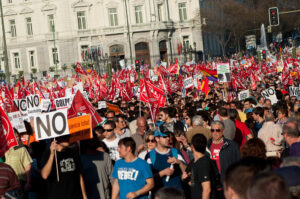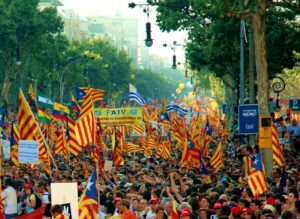Spain is a European Political Anomaly

While most of Europe today is governed by right-wing governments, Spain is one of the only European countries led by left-wing leaders. Despite the growing tide of conservatism sweeping across Europe, including the presence of a strong far-right faction in Spain, a resilient left-wing coalition has successfully maintained its governance since 2018. On November 16, 2023, Prime Minister Pedro Sánchez beat all odds and secured a new term by forming a new – and extended – coalition. Various political and social factors explain Spain’s (quasi) political uniqueness in Europe.
Spain is one of the two European countries led by a left-wing government
Many European countries have followed the worldwide shift to the right in the last decade, such as Italy, France, Finland, and Greece. Conservative parties took power and are prioritizing neoliberal economic policies coupled with stricter immigration and crime policies. On the contrary, European left-wing parties that are pushing for more redistributionist policies, social protection, and progressive stances on cultural issues have struggled.
However, Spain followed the opposite trend. Pedro Sánchez – the leader of the center-left Spanish Socialist Workers’ Party (PSOE) – became Prime Minister in 2018 after almost 7 years of the conservative People’s Party rule. Sánchez is the head of a PSOE-led left-wing coalition of various progressive parties. Spanish politics has been defined by a two-party system for decades, but several new political parties have gained national attention. These parties have redefined Spanish politics. For instance, the left-wing party Podemos, now a part of large leftist coalition Sumar, along with the far-right Vox and center-right Citizens, have emerged as significant forces in Spanish politics. Nonetheless, Sánchez has managed to strategically take advantage of this changed political landscape and came to power in 2018.
The success of the Spanish left
It could be surprising to see the Spanish left thriving after the country’s 40-year-long right-wing dictatorship under Franco. Franco’s regime ended in 1975 but left lasting consequences on Spanish politics. However, there is still a strong right-wing movement led by former Franco supporters and the Catholic Church. The existence of such an entrenched right-wing movement motivated the left to organize and advance its policies in the post-Franco era.
The People’s Party’s response to the Great Recession spurred the left-wing movement. Spain was the second hardest-hit European country by the financial crisis. Prime Minister Mariano Rajoy failed to address the long-term effects of the crisis. His austerity measures fostered poverty and unemployment reached almost 25%.

The rise of social inequalities led to the emergence of the leftist party Podemos – which found substantial support – and the PSOE’s program shifted to the left. Despite political rivalries, the Spanish left achieved a coalition in 2018. The coalition is politically diverse, and there are many complexities and disagreements within it. For instance, there have been several political turbulences as a result of internal divisions between the PSOE and Podemos, the PSOE and some local parties – on which the coalition rests – and local parties and Podemos.
Despite its internal disagreements, the coalition has achieved a lot. For instance, it raised the minimum wage by 22% in its first months, reformed labour law and housing, and released a new handout for low-income families. The coalition has also made history by introducing the first female-dominated cabinet in Spanish history.
Pedro Sánchez’s political gambling
In the past 5 years, Sánchez has managed to establish himself as the leader of the Spanish left who achieved policy successes at home. A substantial part of the left’s success can be attributed to his leadership of a complex coalition. This coalition contains very different political views within it, but has maintained stability since 2018. Sánchez has faced an increasingly powerful right-wing movement. The pandemic and the economic slowdown it generated boosted the People’s Party and Vox in recent years. Also, the government’s treatment of Catalonian independentist leaders was an unifying issue for the right.

Sánchez’s political career has been characterized by audacious bets. In May 2023, the left underwent an electoral cataclysm as the right tremendously outperformed the government’s coalition during municipal and regional elections. Right-wing parties made these elections a referendum on Sánchez’s government. But Sánchez abruptly ordered a surprise snap legislative election at a time his government suffered from low popularity rates. This political strategy turned out to be successful as the left limited its losses and the right failed to win a majority of seats in Parliament. Sánchez’s tactic shows his political skill. He took advantage of the right-wing parties’ unreadiness to campaign and saved the left despite its bad standing in the polls.
On November 16, 2023, Sánchez secured a new term by finalizing a coalition agreement with left-wing and local parties. Sánchez’s coalition included the Catalonian independentist party Junts. This is a highly contentious issue in Spain as this party launched an illegal referendum on Catalonian independence in 2017. Many of Junts’ leaders faced criminal charges. Sánchez agreed to give amnesty to referendum organizers to get their support in the confidence vote. However, one of Sánchez’s campaign promises was that he would not grant such amnesty. Sánchez’s departure from one of his pivotal campaign promises showcases his adeptness in navigating coalitions and sustaining left-wing governance through agreements forged with right-wing parties. Sánchez’s political strategy shows his desire to stay in power regardless of what it takes, even when breaking political promises that are likely to divide the nation.
Edited by Joseph Pappas.
Featured Image: Pedro Sánchez recibe a Pablo Iglesias (07/05/2019) by La Moncloa is licensed under CC BY-NC-ND 2.0.
